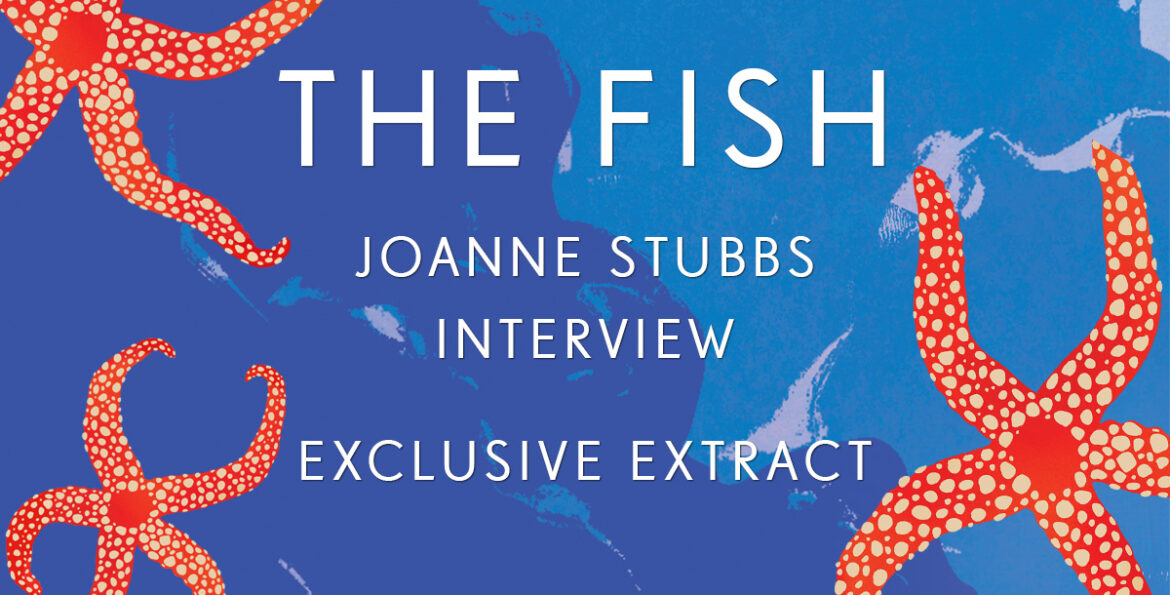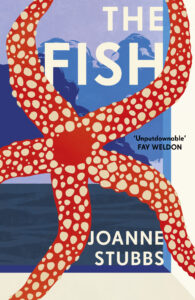

Joanne Stubbs interview and exclusive extract
- 7th October 2022
- Category : Author,Blog,Interviews & Blogs
Joanne Stubbs is the author of The Fish, an engaging literary cli-fi set in the near future as climate change causes unexpected changes, publishing on 06 October 2022. Across the globe, people are getting used to an ever-changing climate – but they are not the only ones adapting. As sea creatures abandon the oceans to live on land, can people accept yet another new normal? Read this interview with Joanne Stubbs to find out more, and to see an exclusive sneak peek of The Fish.

How did you start writing and what does writing mean to you?
It’s always been in the back of my mind that I wanted to write a book, but I never had an idea. In my mid-twenties I saved up to take some time off work to travel, and I kept a blog while I was away – that was how the writing really started. Since then, it’s become more and more important to me. I’ve made friends through writing, I’ve become more creative because of it, I read more widely, and it’s given me a sense of achievement.
If you could describe The Fish in one word, what would it be?
Wry (I hope)
What inspired you to write The Fish?
The Fish came out of a short story. The short story was inspired, randomly, by a Courtney Barnett song lyric. The story was about a Cornish fishing village invaded by walking fish, and I called it ‘The Cod Delusion’ (my best title). I didn’t know then that it was about climate change – I just thought it was a story about how humans and nature interact. Spinning it out into a novel was when I figured out that writing it would also be a way for me to take a topic I find overwhelmingly large (climate change) and put it into a story. So I suppose, ultimately, it was a love of nature that inspired me to write The Fish.
The Fish is written from the perspectives of Cathy, Margaret and Ricky. Why did you choose to tell the story through these characters, and did you have a favourite to write?
Cathy came from my original short story, and Margaret and Ricky came later, when I knew I wanted to write the novel. I don’t remember consciously creating any of them; I wouldn’t say characters come easily to me, but these ones did appear nearly fully formed.
All three characters had their challenges at times. Cathy’s most like me in terms of age, background and country of origin, so she was probably the easiest. But I wouldn’t say favourite! Particularly towards the final round of edits, I was finding her really annoying…
When I got stuck with characters, I found it helpful to think about what actors would play them in the movie. Figuring out that Margaret would (of course) be played by Meryl Streep helped me visualise her when writing scenes and thinking of her emotional responses.
The Fish is set in Cornwall, Malaysia and New Zealand. Why did you choose these settings, and how did you approach writing each place?
I’m lucky to have travelled to the areas that Margaret and Ricky live (Kuala Lumpur and the West Coast of New Zealand), and when I first started writing the novel, it hadn’t been long since I’d been to those places. They were quite fresh in my mind.
Environments are changing all around the world, and writing three perspectives gave me the chance to make the story more global. It also gave me the (indulgent) chance to set characters in places I enjoyed revisiting through words.
What’s the most surprising thing you’ve learned from writing The Fish?
Fish already exist that can live and breathe out of the water – Wikipedia says that the African lungfish ‘can live out of water for many months in burrows of hardened mud beneath a dried streambed’.
What do you hope people take away from reading your book?
This is a hard question. I didn’t want to write a dystopian climate fiction novel where everyone dies in the end. I wanted to write a novel where the environment is this weird, slightly threatening thing that might cause problems but also might be easy to ignore. That seems more realistic to me. If people get a sense of that, great!
What’s your favourite book and who is your favourite author?
Another difficult question! I’m a big fan of Barbara Kingsolver. I think her writing is beautiful and her stories really carry me along.
The books I read in my formative years are still the ones I probably love the most – so my favourite book may just be Lord of the Rings. Can’t argue with that.
Right now I’m reading N K Jemisin’s Broken Earth Series and it’s amazing.
Did you always want to be a writer?
It may be the expected response, but yes, I did always want to be a writer! I read a lot of books when I was a kid, and I thought being an author would be really cool.
Do you have writer’s habit that helps you ‘get in the zone’?
No! Please send me one, I need one.
Do you have a writing schedule?
I work part time to support writing, so I have two days a week I can dedicate to it. That doesn’t mean I always spend two days writing – I am a top-notch procrastinator – but that’s the aim.
Where do you tend to write?
At my desk on the top floor, or it it’s warm enough, in the shed. My cat hangs out with me sometimes, although he prefers interrupting Zoom meetings.
What’s a piece of advice you can give to aspiring authors?
Join a workshop group if you can – learning to critique other people’s writing has really helped me to be more objective about my own.
Also, write what you want to write and do it for yourself. It takes time and dedication to write, so you may as well enjoy it.
*
Keep reading for a sneak peek of The Fish…
When my tray of seedlings is waiting at the end of the row, I wade towards it, enjoying the squelch. I pick up the first little plant and run my fingers through its leaves. It is luscious, flat-edged and sharp-tipped, and it smells like earth. The pot it’s in has turned mushy from all the water it’s soaked up, like cornflakes left in milk.
‘We should be able to get forty-five plants in one row,’ Ephie says, looking about her. Everything is calculated, everything organised right to the end. We’d have a wild bog, no more planning than that, if it were left to me.
I hold the plant up. ‘How do I do this, then, just stick it in the channel?’
‘Use your fingers to make a little hole for it to go into… There, at the start of the channel.’ She points, directing me, as I hover the plant above the surface of the water, picking our spot. ‘The earth should be soft enough to scoop out and then just, well, plant it.’
It’s a tricky business. I put the plant down again so that I can use two hands to dig, but water and mud seep back into the hole as soon as I make it, and I feel like a child on the beach trying to stop waves from washing away the walls of my sandcastle. I squat down to get a better angle, and feel the cold of water soaking into the bum of my shorts. Reminding myself there’s a hot shower at the end of this, I sink a little lower, getting balanced, pants soaking in water now, and decide on a two-pronged attack – scoop then shove. I pick the seedling up again and ram its squashy little pot into the half-formed hole, mud squeezing between my fingers. The leaves are wonky, but the thing is in earth. Ephie says it’s perfect and that I should get on with the next. The second one is just as hard to plant, but the third seedling is better. By the fourth, I feel I’m getting the hang of it. The water is cool on my wrists, the mud soft, and the smell of soil is in my nose. The gulls have gone quiet, perhaps out at sea, and Ephie starts to sing as she works. She has a terrible, monotonous voice, which makes me smile. I really love the few things she’s not excellent at.
I am scraping out a hole halfway down the row when I feel something move against my foot, like an eel or a python or a water-borne spider, and I scream.
‘Something touched me,’ I shout. I splash my way through the water, desperate for dry land. ‘There’s something in the water. What is it?’
Ephie frowns and I let out a stream of nervous laughter, breathing hard, panting over the safety of green grass. She bends down, looking into the trench I’ve just evacuated. She waits. Nothing.
‘Maybe a frog? Or you might have just imagined it?’ she says.
I shake my head. ‘You had to make me take off the wellies.’
‘Don’t be a baby. Go and put them back on if you’re that upset about it.’
‘I guess a frog is OK.’ I hate the way she challenges me. I step gingerly back into the water.
She smiles, to win me back. ‘Yeah, I’m sure it was just a little frog. Probably had the fright of its life. Bit of a shock for everyone,’ she says.
I nod and tell her she’s probably right. I believe that she’s right for another thirty centimetres of planting. Then I see it: a silver flicker in the brown water.
‘It’s a fish!’
*
The Fish is publishing 06 October 2022. Get your copy now from Blackwell’s, Waterstones and Bookshop.org.














